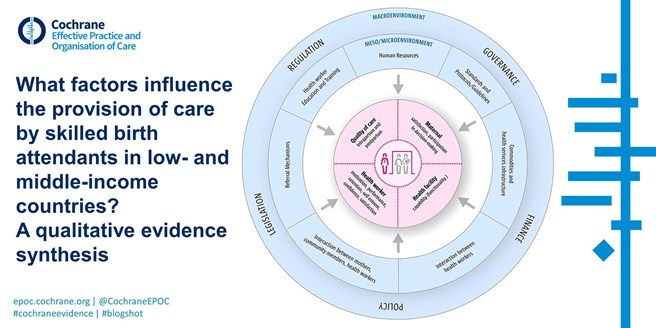Factors that influence the provision of intrapartum and postnatal care by skilled birth attendants in low- and middle-income countries: a qualitative evidence synthesis
Friday, 17 Nov 2017A new Cochrane qualitative evidence synthesis that has been published, describes factors that influence the quality of maternity care in low-and middle- income countries. This evidence is useful for managers that seek to improve the quality of maternal and neonatal health services.
In many low- and middle-income countries,many mothers still die during childbirth. Women are encouraged to give birth in health facilities rather than at home so that they can receive care from skilled birth attendants. A skilled birth attendant is a health worker such as a midwife, doctor, or nurse who is trained to manage a normal pregnancy and childbirth, and to refer the mother and newborn if complications arise. The skills, attitudes and behaviour of skilled birth attendants, and the extent to which they work in an enabling working environment, impact on the quality of care provided. Where skilled birth attendants experience difficult working environments, do not have adequate training and support or have poor attitudes towards their work, mothers and babies are likely to receive poor care.

A team of researchers at the Norwegian Institute of Public Health, the Uganda National Health Research Organisation and the South African Medical Research Council conducted a synthesis of qualitative studies to identify factors that influence the provision of maternity care by skilled birth attendants in low and middle-income countries. 31 qualitative studies that explored the views, experiences, and behaviours of skilled birth attendants, and conducted in Africa, Asia, and Latin America were included. Participants were skilled birth attendants including doctors, midwives, nurses, auxiliary nurses and their managers.
This Cochrane evidence synthesis found that many factors influence the care that skilled birth attendants provide to mothers during childbirth. These include access to training and supervision; staff numbers and workloads; salaries and living conditions; and access to well-equipped, well-organised healthcare facilities with water, electricity, and transport. Other factors that may play a role include the existence of teamwork, trust, collaboration, and communication between health workers and with mothers.
Dr Susan Munabi-Babigumira, lead author of the synthesis noted that, ‘This qualitative evidence synthesis helps explain why the quality of maternity care in some low- and middle- income country settings is poor. More needs to be done to address the human resource and infrastructural challenges that prevent health workers in low- and middle- income country settings from providing good quality maternity care. We have provided a set of questions to guide programme managers seeking to improve health services, and a set of priorities for research based on the gaps in the body of literature.’
Dr Harriet Nabudere, one of the review authors commented that, ‘The findings from this synthesis provide research evidence to support decisions by health managers, practitioners and policymakers when addressing barriers faced by some health systems in Low and middle-income countries.International actors can also use this evidence to support countries to strengthen health systems to improve health outcomes.’
Access the full-text open access article here: 10.1002/14651858.CD011558.pub2/full
For more information, please contact Susan Munabi-Babigumira: Susan.Munabi-Babigumira@fhi.no
Tag Cloud
